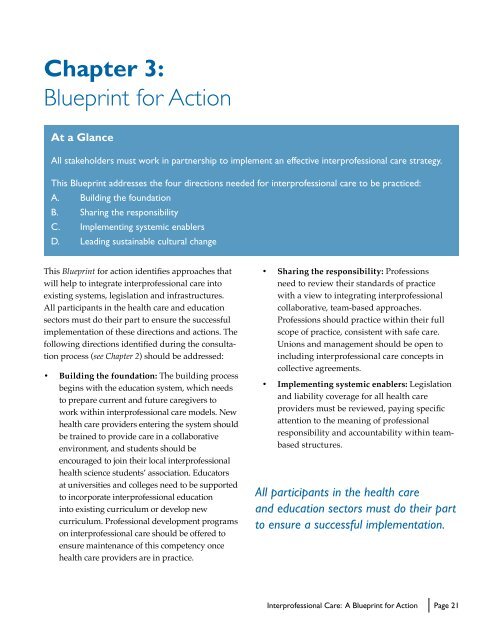Interprofessional Care: A Blueprint for Action - HealthForceOntario
Interprofessional Care: A Blueprint for Action - HealthForceOntario
Interprofessional Care: A Blueprint for Action - HealthForceOntario
Create successful ePaper yourself
Turn your PDF publications into a flip-book with our unique Google optimized e-Paper software.
Chapter 3:<br />
<strong>Blueprint</strong> <strong>for</strong> <strong>Action</strong><br />
At a Glance<br />
All stakeholders must work in partnership to implement an effective interprofessional care strategy.<br />
This <strong>Blueprint</strong> addresses the four directions needed <strong>for</strong> interprofessional care to be practiced:<br />
A. Building the foundation<br />
B. Sharing the responsibility<br />
C. Implementing systemic enablers<br />
D. Leading sustainable cultural change<br />
This <strong>Blueprint</strong> <strong>for</strong> action identifies approaches that<br />
will help to integrate interprofessional care into<br />
existing systems, legislation and infrastructures.<br />
All participants in the health care and education<br />
sectors must do their part to ensure the successful<br />
implementation of these directions and actions. The<br />
following directions identified during the consultation<br />
process (see Chapter 2) should be addressed:<br />
• Building the foundation: The building process<br />
begins with the education system, which needs<br />
to prepare current and future caregivers to<br />
work within interprofessional care models. New<br />
health care providers entering the system should<br />
be trained to provide care in a collaborative<br />
environment, and students should be<br />
encouraged to join their local interprofessional<br />
health science students’ association. Educators<br />
at universities and colleges need to be supported<br />
to incorporate interprofessional education<br />
into existing curriculum or develop new<br />
curriculum. Professional development programs<br />
on interprofessional care should be offered to<br />
ensure maintenance of this competency once<br />
health care providers are in practice.<br />
• Sharing the responsibility: Professions<br />
need to review their standards of practice<br />
with a view to integrating interprofessional<br />
collaborative, team-based approaches.<br />
Professions should practice within their full<br />
scope of practice, consistent with safe care.<br />
Unions and management should be open to<br />
including interprofessional care concepts in<br />
collective agreements.<br />
• Implementing systemic enablers: Legislation<br />
and liability coverage <strong>for</strong> all health care<br />
providers must be reviewed, paying specific<br />
attention to the meaning of professional<br />
responsibility and accountability within teambased<br />
structures.<br />
All participants in the health care<br />
and education sectors must do their part<br />
to ensure a successful implementation.<br />
<strong>Interprofessional</strong> <strong>Care</strong>: A <strong>Blueprint</strong> <strong>for</strong> <strong>Action</strong> Page 21





